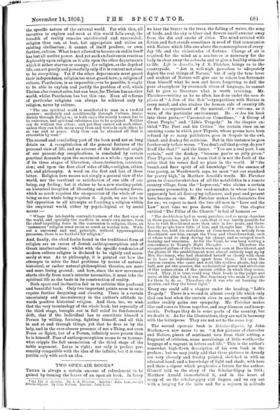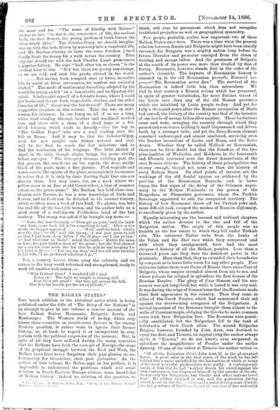TWO OPEN-AIR BOOKS.*
THERE is always a certain amount of refreshment to be gained by turning the leaves of an open. air book. In fancy • (1.) Life in Arcadia. 13y J. B. Fletcher. London : John LatIC.—(2.) Molar-Gipsies. By Jelin Buchan. Loudon: John LILO. we hear the breeze in the trees, the falling of water, the song of birds, and the sky is bluer and flowers smell sweeter away from the din and smoke of cities. The mind satiated with fiction and fact stands sometimes in need of that communion with Nature which lifts one above the commonplaces of every- day life and the vicissitudes of fortune. Change of air is required for the mind as a sea-breeze is necessary for the body to clear away the cobwebs and to give a healthy stimulus to life. Life in Arcadia, by J. S. Fletcher, brings us to the countryside. "Art is well-nigh powerless to adequately depict the real things of Nature," but if only the true lover and student of Nature will give out to others less fortunate than himself what he sees and bears, forgetting to dull the pure atmosphere by overmuch stress of language, he cannot fail to give to literature what is worth receiving. Mr. Fletcher—writing as he so often has done under the nom de plume of "A Son of the Soil "—sympathises with Nature in every mood, and also studies the human side of country life as the accompaniment of the natural,—t1 e outcome, as it were, of the particular environment. He ( iv:des his book into three parts,—" Unconscious Comedians," "A Group of Great People," and "Life's Tragedy." In the chapter en- titled "The Poet and his Critics" the curtain rises on an amusing scene in which poor Thyrsis, whose poems have been refused by so many publishers, goes in despair to the owl,
linnet, and donkey for criticism. But in this instance he goes further only to fare worse. "You don't call that poetry, do you
Stuff like that F" said the linnet. "You are a real poet, I am certain," said the donkey, "because you're so jolly green." Poor Thyrsis has yet to learn that it is not the fault of the critic that his verses find no place in the world. If "the breath and finer spirit of all knowledge" be the essence of true poetry, as Wordsworth says, we must "set our standard for poetry high," in Matthew Arnold's words. Mr. Fletcher
gives us character-sketches of all the notabilities in a remote country village, from the "Layer-out," who claims a certain gruesome personality, to the road-mender, to whom time has apparently lost all destroying influence, and past and present have become as one. Mr. Fletcher makes his characters live for us ; we expect to meet the two old men in "Love and the Law" next time we pass down the village. One chapter entitled "The Pillar of the Church" is full of humour :—
" The Archbishop had so many parishes, and so many churches in those parishes, under his care, that it was hardly possible for him to visit Beechhurst more than once in five years, and there- fore the peqple knew little of him, and thought less. The Arch- deacon, too, held his visitations at Cornchester, so nobody from Beechhurst saw him, except the Vicar and Churchwardens, each of whom went to sleep during his charge, and so escaped much learning and weariness. As for the Vicar, he was busy writing a
concordance to Young's Night Thoughts Therefore the recognised pillars of the Church were not seen at Beechhurst, and the glories of the establishment were almost entirely kept up by Mrs. Sanctuary, who had identified herself so closely with them as to have no individuality apart from them. Not even the various curates, who came and went like restless ghosts, had one half, nor yet one quarter, the ecclesiastical power and attributes of this corner-stone of the ancient edifice in which they minis- tered. They, it is true, could wag their heads in the pulpit and serve at the altar, but it was Mrs. Sanctuary who made it possible for them to do so. Therefore, she it was who set burning the greater, and they the lesser light."
Every one could add a chapter under the heading, "Life's Tragedy." There is a wound in almost every life which only God can heal when the curtain rises in another world, so the author readily gains our sympathy. Mr. Fletcher makes lilac and roses to bloom together, and may-blossom and honey- suckle. Perhaps they do in some parts of the country, but we doubt it. As for the illustrations, they are not in harmony with the letterpress. They are not set to the same key.
The second open-air book is Scholar-Gipsies, by John Buchan,—a new name to us. "A few pictures of character and Nature, pieces of sentiment torn from their setting, a fragment of criticism, some moralisings of little worth,—the baggage of a vagrant in letters and life." This is the author's somewhat high-flown description of his own book in the preface ; but we may justly add that these pictures in Arcady are very cleverly and freshly painted, sketched in with an educated hand, and a knowledge of light and shade, with here and there a vigour which prophesies a future for the author. Glanvil told us the story of the Scholar-Gipsy in 1661; Matthew Arnold immortalised it, and in the heart of
many of us the scholar-gipsy still lingers, and we cry out with a longing for the hills and for a sojourn in solitude on moor and lea. "The sense of kinship with Nature" makes us love "to watch the renascence of life, the earliest buds, the first flowers, the young perfumed birch-leaves, the clear windy skies." The Scholar-Gipsy, we should imagine, was up with the lark, driven by necessity into a vagabond life, and Mr. Buchan wishing to taste the same freedom joined Sandy Scott the tramp for a walk across the country. That any one should rise with the lark Charles Lamb pronounces a popular fallacy. He says: "half after ten or eleven" is the earliest hour to rise. "Not but there are pretty sun-risings, as we are told, and such like gauds, abroad in the world.
But having been tempted once or twice, in earlier life, to assist at these ceremonies, we confess our curiosity abated." The mode of sentimental travelling adopted by the would-be tramp ended "in a lamentable and un-Spartan-like spirit. I bethought myself of a friend's house, where I could get books and decent food, respectable clothes, and the other luxuries of life." Great was the fall thereof ! There are many suggestive chapters in this volume. Take the one on mile- stones, for instance. In our fancy we all of us see a long, white road winding through heather and woodland, marked here and there with a stone of a dead hope or a ful- filled longing, which leads to Arcady,—like the boy in "The Golden Days," who saw a road leading over the hill to Rome. And it may be that the Scholar-Gipsy, with his new insight into things natural and real, will be the first to reach the last milestone and to find the realisation of his longings. The little sketch of April in the hills, though slight, brings the scene vividly before our eyes. `. The blue-grey streams swirling past the dry grasses, the sun-flecks on the rapids, the deep, steely- black of the pools, make a fine picture. Pied wagtails and water-ousts, like spirits of the place, so completely harmonise in colour that it is only by their darting flight that one can
discern them. You may come, too, on a nook where the yellow moss is as fine as old Court-velvet, a blot of summer colour on the grave scene." Mr. Buchan has held close com- munion with Nature, he has a true knowledge of birds and flowers, and no fault can be detected in Lis natural history, which so often mars a book of this kind. We glance, too, into the real life of the bouri-fide tramp, and the author tells us a good story of a well-known Peebleshire laird of the last
century. The tramp was asked if he brought any news :—
"'Name, Sir,' was the reply.—' Then get ye gone,' said the laird, and dinna come back till ye've something to tell.' After a few weeks the beggar appeared Well,' said the laird, what's new the day ? '—` Oh,' said the tramp, I was just gaun to tell ye that I had been dem below i' the ill place sin' I saw ye last.'
And what saw ye there ? ' asked the laird.—' Mickle the same as here, the puir hadden doon wi' the great ; but the Deil showed me a muckle chair aside the fire that he said he was keeping for
tle laird of You see, my dear,' said the old man turning to his wife, I am preferred wherever I go."
Yes, a country breeze blows away the cobwebs, and we return to the busy world refreshed and strengthened, ready to work till another rest comes :—
"Why faintest thou ? I wander'd till I died.
Roam on ! The light we sought is shining still. Dost thou ask proof ? Our tree yet crowns the hill, Our Scholar travels yet the loved hillside."







































 Previous page
Previous page